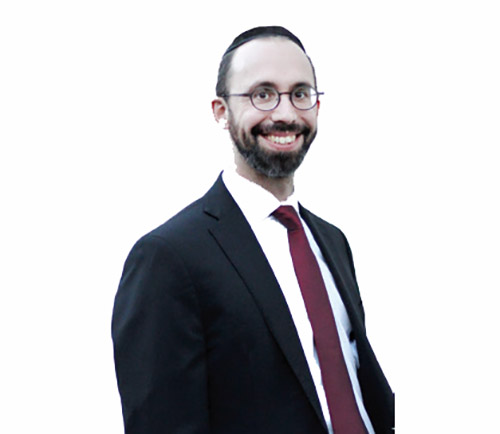
Early in our marriage, my wife and I lived in Eretz Yisroel in the neighborhood of Maalot Dafna, with twin girls of 18 months. The “Maalot” part of Maalot Dafna—the steps of Dafna—described that the whole community was built on a hill, with sets of steps every 20 feet. One day, my wife was bouncing our double stroller down the steps, when a 4-year-old boy, the son of friends of ours, approached her, saying, “I will help you.” He happened to be a strong boy and he did help carry the stroller down the steps! My wife was so impressed. “Where does a 4-year-old boy get the idea and the motivation to notice someone’s problem and then help that way?” It was amazing, yet came as no surprise, since the boy’s parents were always proactively helping others in a very wholesome, healthy way. The boy was simply copying what he saw daily in his parents’ actions.
Being committed to good behaviors infuses an inclination in our children toward copying those good behaviors.
This idea is well illustrated in Parshas Naso and its haftarah, which discusses a nazir—someone who commits not to eat or drink any items produced from grapes, as well as not to cut his hair.
In the haftarah, Manoach and his wife were married for many years without children. An angel appeared to the wife and informed her of the wonderful news that she was finally pregnant, and her child must be a nazir from birth. Therefore, she must refrain from eating any grape products and raise the boy with all the guidelines of the nazir. She tells Manoach the exciting news and he says, “I need the angel to return and instruct us what to do.” The angel returns and repeats exactly what he had instructed to Manoach’s wife. This is very puzzling. Why does the angel need to return to repeat the same instructions?
Rav Shimon Schwab gives a very telling explanation. Manoach had a major question on how to successfully raise his future son, the nazir. Children do as the parents do and not as they say. “How can I raise our child to refrain from drinking wine if I drink wine?” Manoach asked the angel. Rav Schwab notes the angel’s response to Manoach: “You are correct; you will not be able to successfully raise your child as a nazir if you drink wine. Therefore, both of you as parents need to follow the same restrictions. Otherwise, the child will not adhere.” This is a pivotal lesson in chinuch, child raising.
A lady once asked my wife advice on how to stop her young teenage daughter from reading adult romance novels that were very inappropriate. My wife asked her, “Don’t you read those novels also?” “Yes,” she said, “but I hide them and somehow my daughter keeps finding them.” My wife explained that her daughter was merely copying her own actions, and her actions must change if she wanted her daughter’s actions to change.
A nazir does not need to look like one. The typical timeframe for a nazir’s vow is 30 days. Refraining from taking a haircut or shaving for 30 days is hardly an anomaly; a host of men do this twice a year during sefira and the Three Weeks. To refrain from wine and grape products for 30 days is also not so extreme. There are many types of popular diets in which a person must abstain from certain foods for a month or more. What is so wondrous about the commitment of a nazir? A 30-day challenge does not seem so difficult.
The Sforno explains that someone undertaking a commitment to go against one’s natural inclinations is in fact a wonder. The rest of the world rushes to fulfill their desires, while this individual restrains his indulgence. The Sforno notes that the nazir is not fasting or afflicting himself and is able to maintain his regular self. He must simply refrain from eating or drinking grape products, like wine, since they are intoxicating and loosen the moral compass.
While we are not nazirs, we can apply the lesson of the nazir. We can take on a 30-day challenge to take control of an area of our lives for Hashem. We should then take stock of all the times in our lives we have done so and appreciate the accomplishments. The greatest wonder of such a change is the impact on our children. Indeed, the eyes of our children watch our actions and often copy them.
This 4-year-old boy did something wondrous…because his parents did so all the time.
By Rabbi Baruch Bodenheim
Rabbi Baruch Bodenheim is the associate rosh yeshiva of Passaic Torah Institute (PTI)/Yeshiva Ner Boruch. PTI has attracted people from all over northern New Jersey, including Teaneck, Bergenfield, Paramus, Rockaway and Fair Lawn. He initiated and continues to lead a multi-level Gemara learning program. Recently he has spread out beyond PTI to begin a weekly beis midrash program with in-depth chavrusa learning in Livingston and Springfield. This year he joined Heichal Hatorah in Teaneck as a Gemara iyun rebbe. His email is [email protected].










